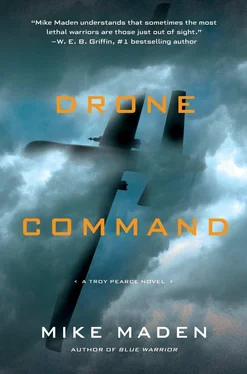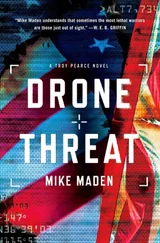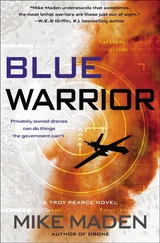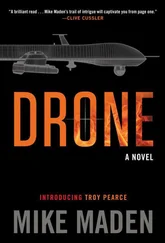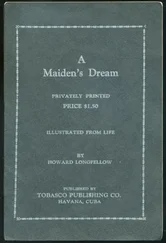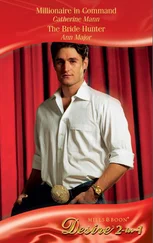Shafer was a former chair of the Senate Armed Services Committee, the perfect person to bridge Lane’s political and experiential gap. Lane was viewed by establishment Washington as a country rube from Texas despite his six years in Congress, armed only with boyish good looks, a second-rate state university degree, and an excellent combat record.
But it was the four-leaf clover shoved in Lane’s pocket the old hands most deeply resented. Dumb luck had won him the presidency in their opinion.
If Senator Fiero’s campaign hadn’t been sunk by the mysterious and incriminating Bath leaks, she’d be the one sitting in the Oval Office today, not Lane. Fiero was a known commodity. Easy to work with. She understood how the game was played.
Likewise, his presidential predecessor, Robert Greyhill, whose reelection campaign was doomed from the start thanks to the self-serving betrayal of his vice president, who was caught on tape recommending the execution of the American war hero Troy Pearce. Pleading ignorance of Gary Diele’s crimes only made former president Greyhill appear even more incompetent and out of touch than he was commonly portrayed.
That left Lane, a genuine outsider, as the last man standing. He beat Greyhill handily despite the hundreds of millions of dollars of soft money poured into Greyhill’s campaign coffers, but Lane won with less than half of eligible voters participating.
Shafer’s role was to groom and guide the new president into a prudent course of action. The power players behind the known faces in Washington — the money men from Wall Street, Silicon Valley, Hollywood, and even overseas — needed to be sure that Lane could be counted on. Shafer all but guaranteed it.
Shafer genuinely liked Lane and was charmed by his clumsy campaign rhetoric, even when he stole the line from JFK’s famous inaugural, “Ask not what your country can do for you, ask what you can do for your country.” It was a hateful message for the rabid left wing of his party — the social-justice warriors, fourth-generation welfare moms, and Occupy Wall Street progressives — but centrist Democrats and moderate Republicans loved it.
Lane was worried. China was, without a doubt, a regional threat and increasingly a global one as well. The conventional solutions to the China problem didn’t interest him — ignoring or provoking them would only lead to an escalation of the crisis, if not war. That’s why he turned to Pearce and Myers for a private brainstorming session months ago, and that’s how the three of them came up with their current plan. Huge payoff, low risk — except for Pearce and Myers. Both of them understood the risk. Accepted it without flinching.
Lane turned to Chairman Onstot. “Okay, General. Let’s lay this thing out.”
The chairman flashed a digital projector. A regional map appeared. He highlighted features with a laser pointer.
“The Chinese are clearly becoming more aggressive, not only in the East China Sea, but in the South China Sea as well, pushing out to the so-called nine-dash line. The nine-dash line—”
“—is the Chinese historical claim to the waters and territories in the region,” Lane interrupted. “Disputed by every other nation in the area.” He wasn’t about to let the chairman treat him like a junior officer at an ROTC luncheon. “Move on.”
“It’s also part of the First Island Chain Doctrine,” the chairman continued, somewhat humbled. He ran the laser pointer from the Malay Peninsula in the south to the Kamchatka Peninsula in the north, touching on Taiwan, the Philippines, and the Japanese islands in between. “In the event of war with the United States, Chinese military doctrine calls for preemptive strikes on all of our naval and air bases and other significant assets, including carrier groups, in this geographic chain of archipelagos in order to secure the Chinese mainland from American attack.”
“The strategic importance of the East China Sea to Chinese military doctrine can’t be overstated.” This from the marine corps commandant.
“Beyond expanding its nuclear capabilities, the primary emphasis of China’s massive military buildup over the last ten years has been to develop weapons and assets that will enable them to carry out the First Island Chain Doctrine,” the admiral said. “That’s the primary reason they’ve acquired their first aircraft carrier and pushed their conventional ballistic-missile programs forward. As I’m sure you’re well aware, Mr. President, the Chinese have been increasing their annual defense spending by double digits over the last decade, even as we’ve been cutting back, both in terms of spending, but also in actual force reductions, especially in naval assets. They’re getting stronger even as we weaken.”
“But President Sun is a reformer, not a hardliner,” Wheeler said. “Our ambassador has met with him several times. Assures me he’s a reasonable man.”
“I’m sure he is, but like you said, he’s a reformer. He’s had to pick and choose his battles. In order to wage his domestic anticorruption campaign, he’s given a freer hand to the PLA and the foreign policy hawks. The Chinese economy has its own problems, and securing ECS resources for themselves will go a long way to sort those out.”
“So why not let the Chinese secure the ECS?” Garza asked. “How is our national security threatened by this move?”
Lane picked Garza to be his NSA because the former Green Beret was unafraid to ask the hard questions.
“Because Japan will feel forced to respond,” Wheeler said, nodding at the silent looping Japanese video on the screen. “Imagine if China suddenly claimed the Gulf of Mexico and all of its natural resources as sovereign Chinese territory. We’d feel compelled to respond vigorously, especially if Chinese warships suddenly turned up outside Houston or New Orleans.”
The marine corps commandant nodded in agreement. “And if the Chinese grab the ECS, they’ll feel emboldened to grab the South China Sea as well. Maybe even Taiwan.”
“Okay, Taiwan, the Philippines, the Spratlys — let China take it all. How does that actually threaten us?”
“Don’t you know the history of Red China? Murdering tens of millions of their own in the Cultural Revolution? Their ground war against us in Korea, their proxy war against us in Vietnam?” The marine general’s voice seethed. “China is our greatest geopolitical challenger. A world dominated by Communist China is a world that none of us in this room want to live in.”
“Ever heard of Tibet?” Wheeler asked, sarcasm dripping.
“So, I’m hearing domino theory 2.0, is that it?” Garza was throwing Vietnam right back in their faces. “You’re fucking kidding me, right? Next thing you’ll tell us is that we have to win their hearts and minds.”
Lane tried not to laugh. The Tank was famous for its frank discussions. Garza was laying it on thick, but Lane had told him to. He needed to see where the chiefs really stood.
The chief of naval operations leaned forward, clasping his hands together. “Fifty percent of global merchant fleet traffic passes through the South China Sea, much of it making its way north to the ECS. Oil tanker traffic in these disputed waters is three times greater than the Suez Canal and more than five times greater than the Panama Canal. We’re talking about China seizing control of the majority of global commerce. Does that sound like the Chinese are fucking kidding, Mr. Garza?”
Garza raised a hand in mock surrender. “Okay, just checking. If we’re going to war with the Chinese, I just wanted to be sure it was for a damn good reason.”
So did Lane. Good job, Jim .
“So we’re back to sending the Chinese our own message,” Shafer said. “And we’re running out of time. I spoke with my counterpart in Tokyo earlier this morning. He says Prime Minister Ito’s hand is being forced by this video. Their cabinet is moving into crisis mode. He said if we don’t act forcefully and immediately, they will.”
Читать дальше
